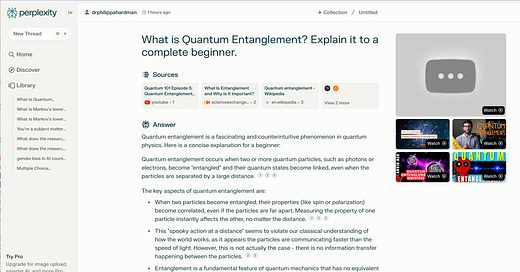The AI-Powered Subject Matter Expert
Will AI eliminate the need for learning designers to work with (human) SMEs?
A question I get asked a lot by learning designers is: can AI augment or maybe even replace the Subject Matter Expert (SME) in the learning design process?
Getting to know the domain and topic we’re designing for is one of the most joyful but also most painful parts of the learning designing process.
Why? The reasons are complex, but they include:
A lack of time and capacity among SMEs.
A lot of “back and forth” admin between learning designers and SMEs during collaboration.
A lack of confidence and feeling of “imposter syndrome” among learning designers who need to “swat up” on often complex topics in order to work effectively with domain experts.
The research question I’ve been exploring this month is: how might AI help to emphasise the joy and help to alleviate some or all of the pain of working with Subject Matter Experts?
Here’s are three things I’ve learned so far:
# 1: AI Can Help Learning Designers to Develop Domain Expertise
Perplexity AI is a great tool to enable Learning Designers get to know the topic they’re designing a course about quickly & effectively.
Here’s an example of how I worked with Perplexity to swat up on Quantum Entanglement:
#2: AI Can Help Learning Designers to Select Instructional & Assessment Strategies
Consensus AI is a great tool to identify the most effective strategies for teaching your topic to your learner.
Here’s an example of how I worked with Consensus to decide how to teach Quantum Entanglement to K12 students:
#3: AI Can Give “Expert” Feedback on Learning Designs
First, use ChatGPT, Gemini or similar to "read" your course design & extract a list of the concepts covered.
Then, use Consensus GPT (a Consensus Plugin for ChatGPT4) to get "expert" feedback on if & how well you have covered the key concepts required to hit your goal.
Tip: you can use this for both from-scratch designs and course re-designs.
Here’s an example of how I worked with Consensus GPT to validate what I planned to cover in my course on Quantum Entanglement for K12 students:
So far, AI has proved a helpful sidekick in helping me to bridge the gap between the learning design (the person who knows how to design the stuff) and the SME (the person who knows the stuff).
Whether AI will eventually enable learning designers to become SMEs and eliminate the need for collaboration (and whether this is something we as learning designers would welcome) is TBC.
Happy innovating!
Phil 👋
PS: If you want to learn more and get hands-on with AI, you can apply for a place on my AI Learning Design Bootcamp.



